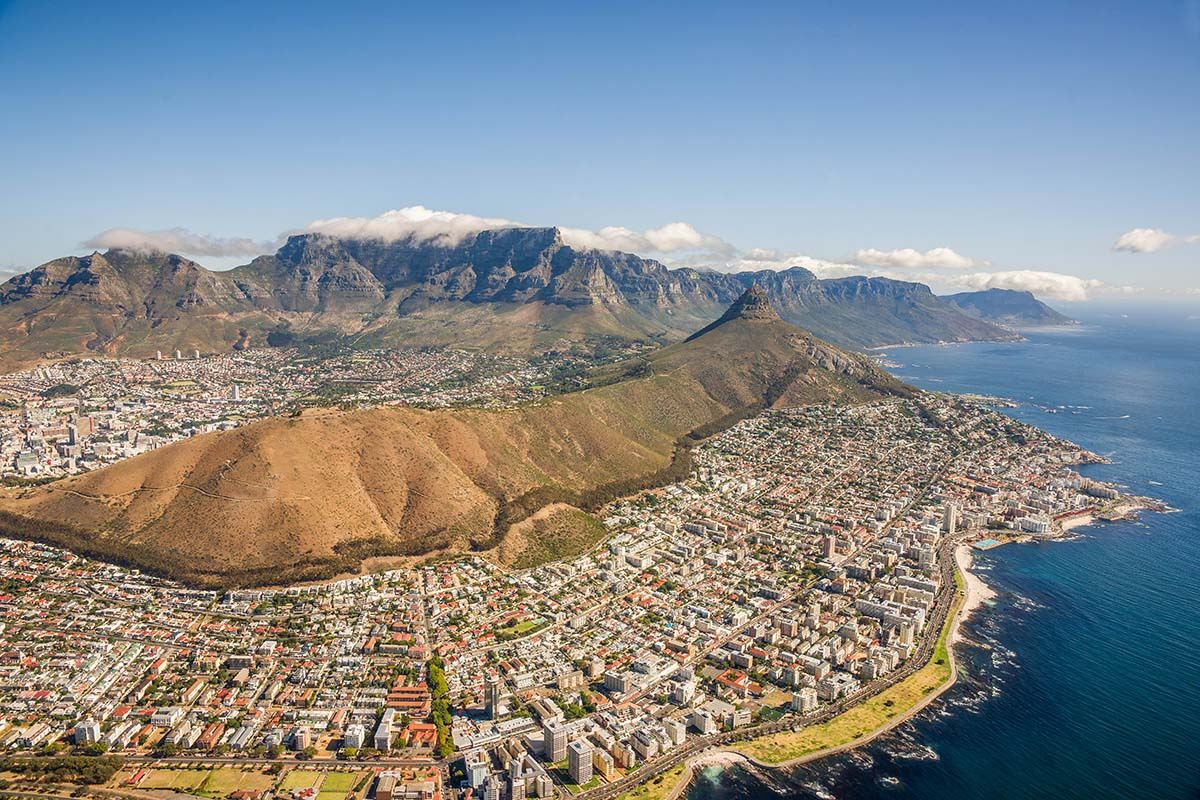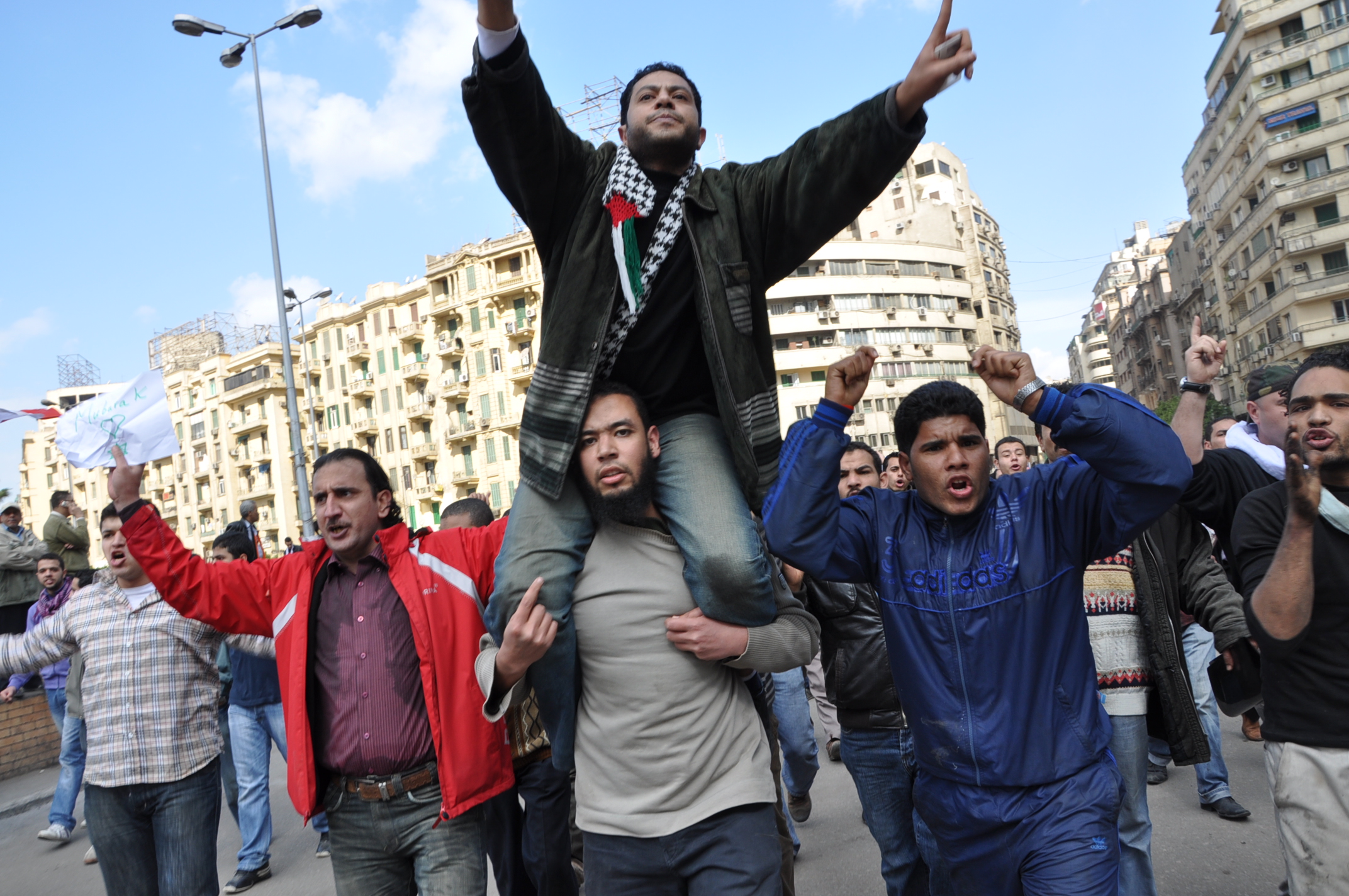Flying into Cape Town, the city’s water crisis becomes apparent even before the plane’s wheels touch down. As the sprawling coastal hub comes into view below, framed by craggy mountains on one side and the Indian and Atlantic oceans on the other, the pilot’s voice crackles over the intercom to welcome passengers to “the Mother City,” where the weather is beautiful and the dams are running dry.
“I would like to remind you that Cape Town is experiencing a severe drought, so during your time here please do your part in conserving water,” he says. “Enjoy your stay!”
Walking through the airport to the baggage claim, enormous signs and banners drive the point home. “Don’t waste a drop! Cape Town is drought stricken,” states one. “Together We Can Avoid Day Zero,” suggests another, alluding to the day on which the city’s water supply will be turned off.
The ride from the airport travels along highways divided by medians of brown grass. If you talk to locals (or read the numerous flyers posted throughout the city) a common set of guidelines emerge: Keep your showers under two minutes. Don’t run your tap while washing dishes or brushing teeth. Only one toilet flush per day. Overall, try to keep daily water consumption under 50 liters—an amount that’s about 16 percent of what the average American uses per day.[1] If everyone follows these rules, maybe, just maybe, Day Zero can be averted.
If that term, Day Zero, sounds apocalyptic, that’s because it sort of is. Cape Town would be the first major city in the world to run out of water, and if it got to that point, citizens would be required to collect their daily ration of 25 liters from guarded checkpoints. It’s unclear what the social fallout would be, but in a city with high crime rates and staggering inequality, it’s safe to predict that things would boil over in some capacity.
So how did a city of nearly four million get to this point? Climate change is almost certainly partly to blame, but just as guilty is another culprit: politics. Cape Town has been failed due to governmental incompetence, corruption, and extreme partisanship. If Day Zero comes, it will be just as much the politicians’ fault as Mother Nature’s. And if it does come, it will undoubtedly impact the poor more than the rich. Today, this is Cape Town’s problem. But in the future this could very well become a reality for cities around the globe. The world needs to understand what has gone wrong in Cape Town so that it can avoid a string of repeated failures in the future, failures that would serve to further expose global wealth disparities and further punish the vulnerable.
If we are to use the trouble in Cape Town as a case study, then a full understanding of the situation is required. For one, it should be noted that drought is not exactly a new phenomenon in the Western Cape, the province of which Cape Town is the capital. Thanks to an extremely variable climate, the region sees a strong fluctuation in rainfall levels from year to year.[2] That means that in some years, like 2014, the rainy winters bring more than enough water to fill up the city’s dams. But in others, almost no rain falls at all. Most of the time those dry years are nothing more than a momentary scare, with water restrictions and eventual timely rains staving off any real danger.
Last year, though, was different. 2017 had the lowest measurable rainfall of any year in recorded Cape Town history, and given that the previous two years were notably dry as well, it compounded to form an unprecedented three-year stretch of drought.[3] We can’t be totally sure, but human-created climate change is likely the main cause for such an anomalous event. Dr. Piotr Wolski, a hydrologist stationed at the University of Cape Town, noted as much in a March interview with The Independent. “Droughts are a natural phenomenon in the Western Cape and the effect of climate changes is that it magnifies all weather events–both drought and flooding–and makes them less easy to predict,” said Wolski.[4]
So even for Cape Town, a city relatively accustomed to dealing with drought, the playing field has changed. The harsh reality of climate change means that the current crisis will almost surely not be a one time event. According to Mayor Patricia de Lille, the area is now operating under a “New Normal,” meaning the city “will not bank on the drought ending but rather actively plan as if it will continue indefinitely.” Water restrictions may become a way of life as opposed to being a temporary inconvenience.[5]
Cities around the world are poised to deal with similar challenges in coming years. In Mexico City, home to more than 21 million people, it is estimated that roughly 20 percent of the population already can’t rely on water coming out of their taps on a daily basis. Ramón Aguirre Díaz, director of the Water System of Mexico City, was pessimistic about the immediate future in a 2017 New York Times article. “Climate change is expected to have two effects,” he said. “We expect heavier, more intense rains, which means more floods, but also more and longer droughts.” If Mexico City were to be hit with an extreme drought? “We’re facing a potential disaster,” he said. “There is no way we can provide enough trucks of water to deal with that scenario.”[6]
The Brazilian city of São Paulo is dealing with a water crisis of its own already, and is anticipating further issues in the future. In a 2015 Time article, Marussia Whately, coordinator of an alliance of 30 NGOs assembled to address the city’s water problem, was frank about the city’s future in the new era of climate change. “Either we change, or São Paulo will continue to face these kinds of problems for years to come,” she said.[7]
The list of vulnerable cities goes on: Jakarta, Melbourne, Lima, Amman, and Los Angeles are just a few of the metropolises at major risk. And all will be looking at the South African government response to see how to best cope. Unfortunately, they won’t learn much. While climate change certainly caused the core of the problem, political bungles exacerbated the issue.
The responsibility of water management in South Africa is hard to pin down, as the local, provincial, and national level all harbor some level of involvement. The national government, however, is in charge of agricultural allocations, a hugely important role given how much water is sucked up by farms and growers. And unfortunately, there is strong evidence to show that the national government failed in monitoring these allocations appropriately. Despite a dry 2015, the Department of Water Services (DWS) did nothing to curtail industry water usage, setting aside well over a third of the Western Cape’s water allowance for the agricultural sector.[8]
Such an amount certainly isn’t unheard of, but given the risk of drought, both present and future, more judicious water distribution was critical. Cape Town had a safety buffer of 28,000 megaliters at the time and nearly all of it was rerouted to agriculture, leaving the city in a precarious state.[7] This was not a one-off mistake either; a report released last November by the South African Water Caucus found that the DWS was plagued by “irregular, fruitless and wasteful expenditure, poor revenue collection, and corruption allegations.”[9]
The Western Cape leaders asked the national government for additional water management funding back in 2015, with the hopes that they could build boreholes and enhance water recycling efforts. The request, however, was denied. The national government did declare some Western Cape areas as drought zones in 2016, but Cape Town was notably excluded, despite more than enough evidence warranting its conclusion. In fact, it took until the last several months for the national government to assist in any meaningful way.[10]
Why the delay in providing help? Some point to simple incompetency, which could very well be true. But a more nefarious reason likely played a role as well: political partisanship. South Africa is dominated by the African National Congress (ANC), the party of Nelson Mandela that dragged the nation out of Apartheid in 1994 and has ruled the country ever since. The Western Cape, though, is controlled by the Democratic Alliance, the main opposition party in South Africa and the greatest direct threat to the ANC’s reign. Tensions between the two parties are high, especially in the wake of ex-President Jacob Zuma’s long and controversial term as leader of the country.
The water crisis provided a perfect platform for those tensions to boil over. In late January, the DA announced that it was considering legal action against the ANC. “The Western Cape as a whole needs the national government to play its legally mandated role to ensure greater water security,” said party leader Mmusi Maimane. “This is not a finger pointing exercise, it is about ensuring that the Constitution is given effect to and that the rights of citizens and ratepayers are fought for and protected.”[11] The ANC was quick to point the blame arrow the other way. “The ANC still sees [ex-mayor and current Western Cape leader] Helen Zille as the root cause for the problems Cape Town now encounters,” said Khaya Magaxa, the provincial leader of the party.[12]
Clearly the water crisis was made more onerous by political bickering. But it also has served to highlight the incredible inequality present in the city. Cape Town is home to some of the richest of the rich and the poorest of the poor, and the fallout from a brush with Day Zero (or even a realization of it) would impact both vastly differently.[13] In a world where water goes from public resource to valuable commodity, the wealthy can mitigate the harm felt. Personal boreholes can be drilled, bottled water can be stocked up on, and if it comes down to it, fleeing the city is always an option.
No such luck for Capetonians living in townships like Gugulethu and Khayelitsha. Unemployment is rampant in those areas, meaning cash can’t be spared for luxuries like water stockpiles. Already present problems like crime and sanitation would only be exacerbated, creating ideal conditions for chaos.[14] That’s why Zille asked, in a column published on The Daily Maverick, “When Day-Zero arrives, how do we…prevent anarchy?”[15] A drought of this scale in any city would be a disaster. A drought in a city like Cape Town could send the whole place up in flames.
To rub salt in the wound, the ones who would be most at risk if Day Zero were to come are also those using the least water. In Khayelitsha, home to roughly 400,000, plumbing is far from a given, with entire blocks using one set of shared toilets. Many households have to travel 200 meters or more to access water, meaning they can only use as much water as they can carry. Informal settlements make up 14 percent of the city’s population, yet use less than four percent of the water.[16][17] All of this just a 30 minute drive away from Camps Bay, where the rich were topping off their private pools. This capitalist pattern of the poor being punished for the greed of the wealthy is no new concept, but the drought has emphasized just how twisted the dynamic really is.
Cape Town might get lucky this time. The winter months are close and it is predicted that they’ll bring substantially more rain than past years. But this threat isn’t going away, not for Cape Town and not for the rest of the world either. Climate change’s impacts are real and permanent, and governments will need to create plans to proactively address them. And while the situation in South Africa may have been severely mishandled, at least it can be used as a cautionary tale. Plus, if there is one bright side to all this, it’s that people really are capable of adapting their behavior to suit the common good. As the drought worsened in Cape Town, citizens stepped up to do their part, no matter how small. Unwashed hair is a sign of commitment. Catching water from the shower and using it to flush the toilet has become common practice.[18]
South Africans widely believe in the Ubuntu philosophy. It says, in a nutshell, that we’re all in this together. A person’s humanity is tied to the wellbeing and care of others as much as themselves. If governments nationwide can adopt that same policy in regards to water conservation, repeats of the Cape Town crisis might be lessened. If not, Day Zero won’t just be an ominous threat. It will be the new normal.
[1] “Water Questions & Answers: How much water does the average person use at home per day?,” USGS, December 2, 2016. https://water.usgs.gov/edu/qa-home-percapita.html
[2] “How severe is the drought? An analysis of the latest data,” GroundUp, January 18, 2018. https://www.groundup.org.za/article/how-severe-drought-detailed-look-data/
[3] “How severe is the drought? An analysis of the latest data,” GroundUp, January 18, 2018. https://www.groundup.org.za/article/how-severe-drought-detailed-look-data/
[4] “Cape Town is approaching drought ‘Day Zero’ and climate change could be to blame,” The Independent, March 3, 2018. http://www.independent.co.uk/environment/cape-town-drought-day-zero-climate-change-global-warming-south-africa-a8236511.html
[5] “Cape Town looks to desalination as an option to relieve crisis,” The Cape Messenger, August 17, 2017. http://www.themessenger.global/2017/08/17/cape-town-looks-to-desalination-as-an-option-to-relieve-crisis/
[6] “Mexico, Parched and Sinking, Faces a Water Crisis,” The New York Times, February 17, 2017. https://www.nytimes.com/interactive/2017/02/17/world/americas/mexico-city-sinking.html
[7] “A Megacity Without Water: São Paulo’s Drought,” Time, October 13, 2015. http://time.com/4054262/drought-brazil-video/
[8] “Cape Town’s water crisis: driven by politics more than drought,” The Conversation, December 12, 2017. https://theconversation.com/cape-towns-water-crisis-driven-by-politics-more-than-drought-88191
[9] “Damning report reveals Department of Water and Sanitation in crisis, and SA’s water security under serious threat,” Environmental Monitoring Group, November 27, 2017. http://emg.org.za/news/213-damning-report-reveals-department-of-water-and-sanitation-in-crisis-and-sa-s-water-security-under-serious-threat
[10] “Cape Town’s water crisis: driven by politics more than drought,” The Conversation, December 12, 2017. https://theconversation.com/cape-towns-water-crisis-driven-by-politics-more-than-drought-88191
[11] “DA blames ANC govt for Cape Town water crisis,” The Citizen, January 25, 2018. https://citizen.co.za/news/south-africa/1794247/da-blames-anc-govt-for-cape-town-water-crisis/
[12] “ANC wants urgent legislature sitting to remove Zille over water crisis,” News24, January 28, 2018. https://www.news24.com/SouthAfrica/News/anc-wants-urgent-western-cape-legislature-sitting-to-remove-zille-over-water-crisis-20180128
[13] “Report lifts lid on inequality in Cape Town,” IOL, June 22, 2016. https://www.iol.co.za/news/south-africa/western-cape/report-lifts-lid-on-inequality-in-cape-town-2037445
[14] “Poor sanitation and lousy maps contribute to Khayelitsha’s crime problems,” GroundUp, November 11, 2014. https://www.groundup.org.za/article/poor-sanitation-and-lousy-maps-contribute-khayelitshas-crime-problems_2433/
[15] “From the Inside: The Countdown to Day Zero,” The Daily Maverick, January 22, 2018. https://www.dailymaverick.co.za/opinionista/2018-01-22-from-the-inside-the-countdown-to-day-zero/#.WqvyjJNuYWp
[16] “Do formal residents use 65% of Cape Town’s water, with half going to gardens & pools?” Africa Check, August 21, 2017. https://africacheck.org/reports/do-formal-residents-use-65-of-cape-towns-water-with-half-going-to-gardens-pools/
[17] “Cape Town’s water woes nothing new for Khayelitsha, Dunoon residents,” News24, November 6, 2017. https://www.news24.com/SouthAfrica/News/cape-towns-water-woes-nothing-new-for-khayelitsha-dunoon-residents-20171106
[18] “‘I only shower every third day,’ says proudly oily Zille,” Sunday Times, September 20, 2017. https://www.timeslive.co.za/politics/2017-09-20-i-only-shower-every-third-day-says-proudly-oily-zille/



